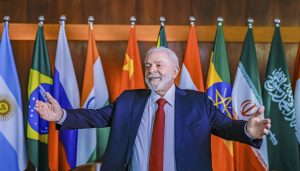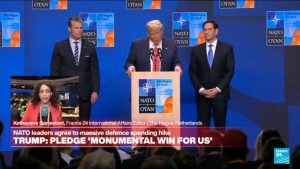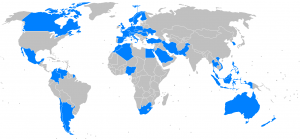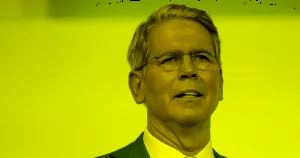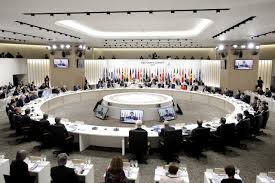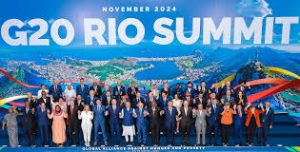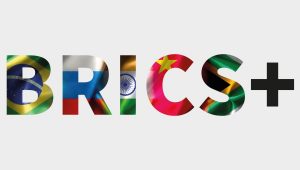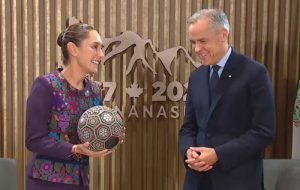
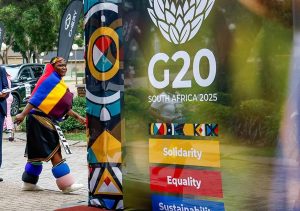
So, we are rolling into an important time for multilateral and regionally strategic action, though realistically it always is an important time. On the multilateral front, notably there is the annual high-level week of the United Nations General Assembly (UNGA). Here a sort description as expressed by John Haltiwanger and Rishi Iyengar at FP:
“World leaders and diplomats will flood into New York City in the coming days for the annual high-level week of the United Nations General Assembly (UNGA), which kicks off on Monday. This year marks the 80th session of UNGA—and it comes at a challenging moment for the world and the U.N. itself.”
I suspect it will give us a ‘temperature reading’ on the UN as it enters UN80.
On the regional front there was the meeting this week between Mexico’s President Claudia Sheinbaum and Canada’s Prime Minister Mark Carney. Closer trade and economic relations were the agenda as both advance to renegotiate USMCA – the United States-Mexico-Canada free trade arrangement – and yes with Donald Trump. Past bilateral agreements make stronger Canada-Mexico ties slightly fraught.
But in setting this discussion up, let me take the temperature on the effectiveness of the Informals – that is the G7, the BRICS and most importantly, the G20. This year’s G20 gathering is hosted by South Africa in November and there has been more than enough friction between Trump and South African President Cyril Ramaphosa. It currently appears as though President Trump will not attend the summit, but the US will be represented by his Vice President J.D. Vance. There is real tension, especially as the United States is scheduled to take hosting of the G20 for 2026.
Thinking about the role and impact of the Informals, most notably the G20, I turned to good colleagues, Colin Bradford and Johannes Linn both from Brookings and elsewhere. Both have long been observers of the Informals but especially the G20. Indeed both were early advocates, along with Canada’s former Finance Minister and then Prime Minister of Canada Paul Martin for a G20 and then a G20 leaders-led multilateral institution. To reflect on the Informals and particularly the G20, I reviewed several pieces from Bradford and Linn but most particularly the piece these colleagues wrote after the first of several summits ending with the Cannes Summit in 2011 – “A History of G20 Summits: The Evolving: Dynamic of Global Leadership”. Journal of Globalization and Development (2):2. The piece enabled my colleagues to reflect on what had been accomplished with the early G20 summits and what the challenges ahead were.
The two, Bradford and Linn were, as the piece reveals, keen observers and strong advocates for a leaders-led multilateral collaborative institution. As they initiated this piece they wrote:
“The G20 summit of key world leaders emerged as a significant institutional component of the global governance architecture from its first surprise gathering in Washington, D.C. in November 2008 to the most recent summit meeting in Cannes in November 2011.”
And the purpose as they saw it of the creation of the Informals starting with the G7:
“Over nearly 40 years the annual G6/7/8 summits dealt with a wide array of issues, ranging from short term financial, economic and political crises, to longer term economic, social, environmental and security issues.”
But the challenges were evident from the commencement of the Informals:
“However, less progress was made in the area of macroeconomic management and coordination, including effective surveillance, resolution of balance of payments and exchange rate imbalances among major economies, and progress on trade liberalization.”
Though the US expressed little interest in moving the G20 to the leader level, the 2008 global financial crisis (GFC), and the threat it posed to global finance, changed minds:
“Just prior to the US election ending the presidential term of George W. Bush, French President Nicolas Sarkozy, as president of the European Union, and Jose Manuel Barroso, President of the European Commission, visited Camp David, a presidential retreat in Maryland, at the invitation of US President George W. Bush. On Saturday afternoon, October 18th, they announced their intention to call a summit involving nations from around the world to reflect the world-wide nature of the financial crisis but they did not indicate which configuration they would choose.” …
“The first G20 Summit was held in Washington, DC, on November 15, 2008, at the National Building Museum, with ministers of finance joining the leaders for each G20 nation, plus the Netherlands and Spain, which President Sarkozy had pushed to include, in addition to the heads of various international institutions. This made for a huge summit table, exacerbating the problem of size of an enlarged summit grouping. But the purpose and the outcome of the summit was to discuss “principles of reform” – coordinated stimulus to prevent a deep recession and reform of the global financial system to prevent a recurrence of the crisis –, rather than to reach specific agreements, and to set in motion processes among G20 ministers of finance, which would develop a more specific and ambitious agenda.”
And something like a conclusion went like this:
“The good news is that the G20 embraces a much broader group of countries, cultures and economies than the G8. The G20, for all its flaws, is a realistic and broadly representative meeting of the world as it is and will increasingly be, not the world that was. In addition, the G20 has a strong foundation in the ten-year history of the G20 ministerial meetings, developing a strong network among officials of communication, consultation and concertation. The strength of this network of senior officials is the foundation of G20 Summits and provides the means of moving the global agenda forward continuously from one presidency to the next.”
“The bad news is that the G20 summits appear to the public around the world to be more conflictive than cooperative, and hence less effective. But if the idea of G20 Summits is also to connect leaders to their publics in providing global leadership on issues that are simultaneously domestic and international, then the embodiment of the domestic political conflicts in the global treatment of those issues makes summits more real and less rarified.”
“The G8 Summits were exercises in diplomacy and international cooperation. The G20 Summits thus far into their history are more complex exercises embodying contradictory forces arising from domestic political struggles to deal with the new inter-connectedness of challenges and the new nexus of the global and domestic dimensions of economic problems affecting the ordinary citizen.”
The challenges were, and are, real. In a sneak peak over the impact and influence of the Informals, let me identify a small snippet of a very large edited volume by by Andreas Freytag and Peter Draper, as editors for, The Elgar Companion to the G7, being published by Edward Elgar Publishing, in the near future. I was fortunate enough to participate with a chapter entitled, “The rise and decline of the First Informal: the changing character of the G7 summit”. Notwithstanding the lead the chapter examines all the key Informals. From my perspective the Informals are close to unique for the fact that they are leader-led:
“Much has been made by observers and experts of the informal nature of these bodies in contrast to conventional formal institutions. And indeed this was a quite different institutional construction, as early observers like Nicholas Bayne and other diplomats were quick to point out. But even these early observers of the Informals did not make enough of the fact that these Informals were annual summits, yes, but also, and pointedly, that these particular forums, the G7, G8 and G20 were, and are, leader-led.”
“Beyond the question of representation, however, there is the continuing, crucial question about the effectiveness of all these Informals. What impact have these Informals had in fashioning policy and, most critically, in advancing collaboration and global governance policymaking?” …
“Without giving the “story” away at this point in the narrative and analysis of the Informals, it is evident in reviewing the life of the Informals that international relations forces have had a dramatic impact on all the Informals and their capacity to advance collaborative global governance policymaking. And examination of their structures and processes shows that they have not led to the desired policy leadership that was hoped for by early political leaders. This, then, is not just a story of the rise of the Informals, but equally, it would seem, their “fall”.”
Multilateral collective action remains a promise unfulfilled in the global order. Global leadership continues to fall short in the maelstrom of geopolitical tensions of the leading states.
And it is then not surprising that I turn to bilateral and regional actions in the midst of all this geopolitical rivalry, especially in the context of Trump 2.0. I was, therefore, attracted to the consequences of the meeting of the leaders of Mexico and Canada. As described in the Daily Review of WPR:
“Mexican President Claudia Sheinbaum hosted Canadian Prime Minister Mark Carney this week for a summit in Mexico City that likely would not have happened if not for the ongoing challenge posed by Donald Trump’s return to the White House.” “Trump has imposed tariffs of 35 percent on Canada and 25 percent on Mexico, ostensibly as punishment for failing to address cross-border drug trafficking and illegal migration, though many goods are exempt due to the U.S.-Mexico-Canda Agreement, the free trade deal that the three countries signed during Trump’s first term as a replacement for NAFTA.”
| But the future of USMCA is unclear. Again from WPR a view of the future: |
|
| In the first negotiation severe tensions were created by a bilateral dael between Mexico and the US: |
|
So, this brings us to now: “As part of their bid to mend ties, Carney and Sheinbaum signed a new “comprehensive strategic partnership,” which they said would “complement” the USMCA. They also agreed to strengthen direct commercial links between the two countries, including through maritime trade that doesn’t rely on crossing U.S. territory.” “At next year’s review, the three countries will need to agree on whether to renew it—potentially with updated provisions. Failing to do so will trigger a series of annual reviews beginning in 2027 for ten years, before its scheduled expiration in 2036.”
“Given Trump’s penchant for unpredictability and chaos, nothing can be ruled out. For Canada and Mexico, steering the talks to a mutually beneficial outcome will mean first overcoming the mistrust between them.”
| So there we are: ‘glancing back; but looking slightly askew at the immediate future. |
Image Credit: Observer Research Foundation

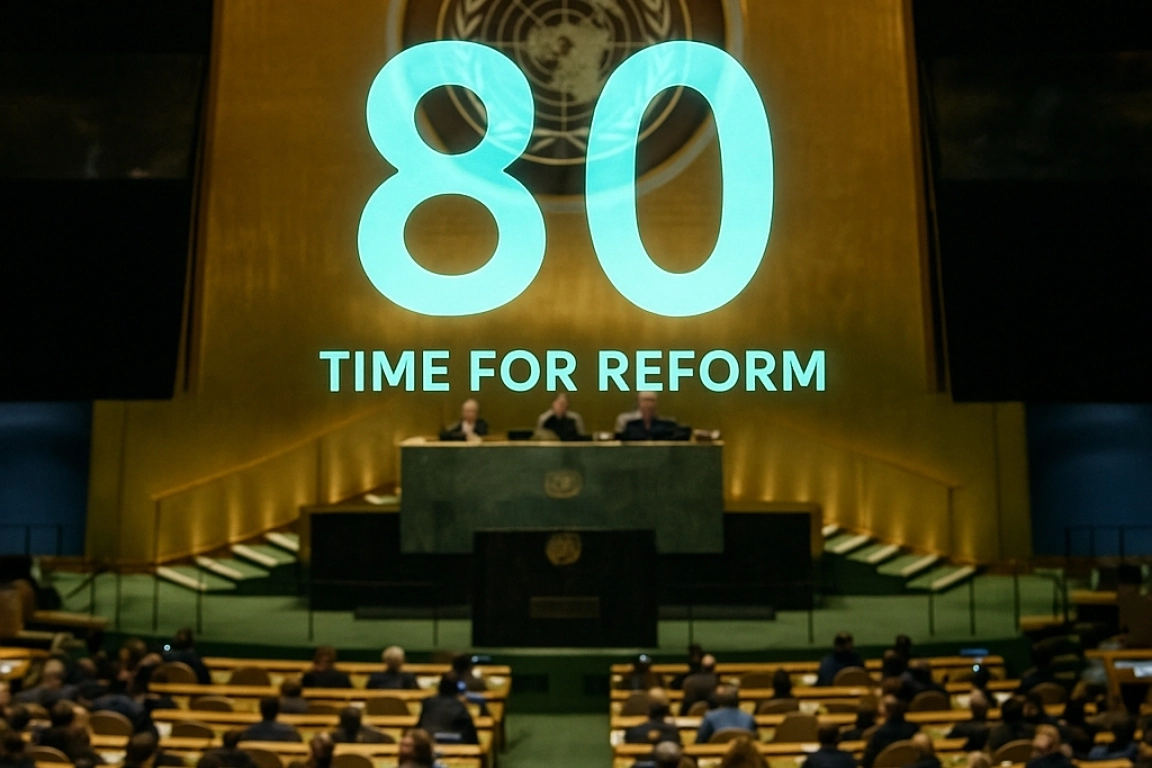 I’ll start by returning to a subject I broached in this earlier Substack Post,
I’ll start by returning to a subject I broached in this earlier Substack Post, 